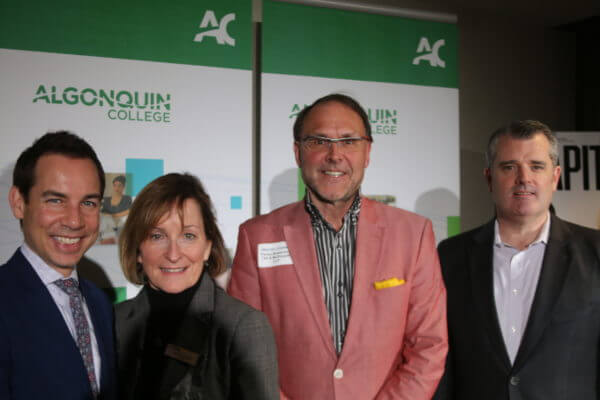Capital Magazine celebration event features Cheryl as panellist
Posted on Friday, January 20th, 2017

Photo: Alex Munter, CEO of the Children’s Hospital of Eastern Ontario, left, Algonquin College President Cheryl Jensen, centre, and Warren Creates, head of the Immigration Law Group at Perley-Robertson, Hill and McDougall, were the evening’s panelists.
Capital Magazine celebrated the launch of its second edition, which features Algonquin College President Cheryl Jensen on its cover, at a networking and panel event at the College on Thursday evening.
About 70 guests invited from the community attended the event, which picked up the theme of the issue, which focuses on how to bridge the talent gap in the city.
Cheryl was joined on the panel by Alex Munter, CEO of the Children’s Hospital of Eastern Ontario, and Warren Creates, head of the Immigration Law Group at Perley-Robertson, Hill and McDougall. The panel was moderated by Ian Faris, President and CEO, Ottawa Chamber of Commerce.
The central idea the panel explored was the skills or talent gap that is predicted to widen over the next few years in numerous areas, including skilled trades, health care, engineering, and social and community service work, and what is being done about it.
“The skills gap is real,” Cheryl said, noting that high-tech employers have told her that they can’t get enough skilled employees. “There is an urgent need for people with the right skills and that’s our job here at the College, to make sure we match that.”
Cheryl said Algonquin College was very well-placed to help fill that gap, and pointed to its ability to quickly put in place courses that meet an identified need, the immigrants it draws to our campuses for training, its focus on welcoming a diversity of people, and in its strong focus on innovation and entrepreneurship.
“We see our place in the community as the bridge between our learners and future employment,” Cheryl said. “And as that bridge, we need to stay connected to your needs, the employers, to ensure we are able to provide our students with the skills you are looking for.”
Creates said that in addition to the practical skills, workers would need to have strong “soft skills”— Cheryl called them “innovation skills” — such as communication skills, time-management skills, critical thinking skills and curiosity, and he said he thought they were being taught here at Algonquin.
Cheryl agreed, saying, “We really see it as our obligation at Algonquin to start building those innovation skills in students. And I believe these skills can be taught.”
The panel also discussed barriers that might stop immigrants from gaining employment in the city, including a lack of Canadian experience, credentials that aren’t recognized in this country, a lack of English- or French-language skills, and a lack of cultural understanding.
Read the Capital Magazine article here.
- Posted in
- Community